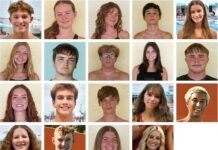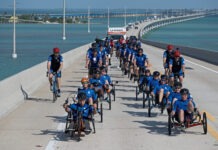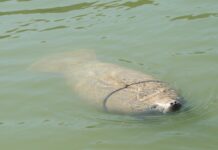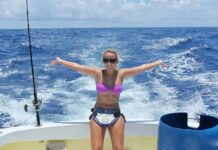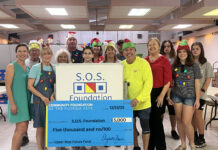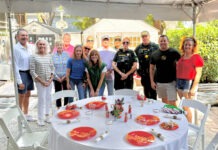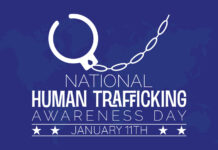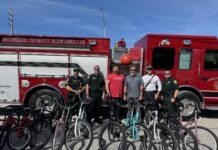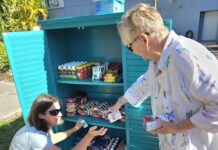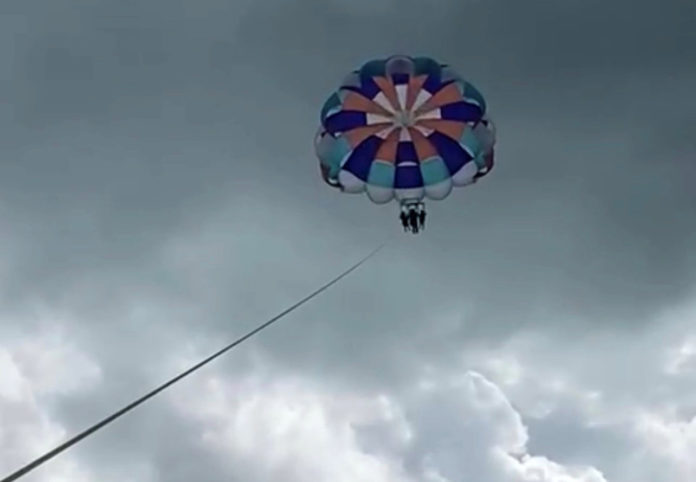
A Memorial Day parasailing tragedy that left one woman dead and her son and nephew injured may now head to court, according to a lawsuit filed on the woman’s family’s behalf by Coral Springs’ Haggard Law Firm.
On May 30, 33-year-old Supraja Alaparthi was taking a parasail flight with Lighthouse Parasailing out of Marathon along with her 10-year-old son Sriakshith Alaparthi and 9-year-old nephew Vishant Sadda. According to an FWC 24-hour report released a day after the incident, a strong gust of wind “pegged” the parasail, a term used to describe when a parasail becomes controlled by the weather conditions instead of the towing vessel and begins to impede the safe operation of the towing vessel by becoming a sail.
With the parasail pegged, the boat’s captain, Daniel Couch, intentionally cut the line tethering the three victims, who dropped to the water and were dragged by the freed parasail across the surface until it collided with the old Seven Mile Bridge, throwing the three into a piling.
Nearby Marathon Capt. John Callion acted as a good Samaritan, approaching the parasail and cutting the three victims free from their harnesses to take them to shore after he saw the collision. Supraja was pronounced dead at the scene when she reached land, according to FWC’s report. Sriakshith suffered minor physical injuries, while Sadda was airlifted to Nicklaus Children’s Hospital in Miami. According to Haggard Law Firm’s press conference announcing the suit on June 28, Sadda faces additional consultations and surgeries with plastic surgeons to repair damage to his face.
A copy of the lawsuit provided to Keys Weekly by Michael Haggard and Pedro Echarte III details the wrongful death claim and two personal injury claims brought against Lighthouse Parasail, a North Carolina-based company that had opened a second location operating out of Marathon’s Captain Pip’s Marina.
According to the suit, a total of 12 family members boarded the M/V Airborne – loading the boat to capacity – on the day in question and completed one successful flight before the fatal flight occurred. Though some early accounts gave the impression that strong wind gusts occurred suddenly, Haggard Law Firm’s press conference included photos taken by the family that the firm claims as evidence of obvious inclement weather.
“We have talked to five other vessels throughout Marathon that came in early that day because of the horrific winds and weather that was coming in through the Middle Keys that day,” said Haggard. “In fact, the family had several conversations with both the captain and the first mate: ‘We can come back tomorrow.’ … The captain said, ‘No, we will be fine.’”
Among more than a dozen allegations, the suit claims that Lighthouse Parasail failed to adequately monitor the weather before and during the flight, failed to give its passengers and parasailers appropriate safety instructions and in-case-of-emergency briefings, did not have proper equipment aboard the boat to monitor the weather, chose to conduct a parasail flight in unsafe weather, and failed to execute alternate emergency procedures rather than cutting the tow line to detach the parasail.
“There were other maneuvers (Couch) could have taken,” said Echarte in Haggard’s press conference. “He did the one thing you are not supposed to do.”
Florida Statutes Section 327.375 details requirements for commercial parasail operators. Among other provisions, the law dictates that: vessels must be equipped with a functional VHF marine transceiver and a separate device capable of accessing current weather forecasts and conditions; commercial parasailing is prohibited in sustained winds of more than 20 mph, gusts of 15 mph or more above sustained winds, wind gusts exceeding 20 mph, or within seven miles of a known lightning storm; and that operators of a commercial parasailing vessel must use all available means to determine and record forecasted weather conditions.
The regulations have been in place since 2014, when the White-Miskell Act, named after two parasailing accident victims, went into effect. The new lawsuit claims that Lighthouse was in violation of several critical parts of the safety procedures established to prevent accidents such as this one.
“It was absolute negligence, a violation of statute in the state of Florida to put those three souls multiple hundreds of feet in the air on this day,” said Haggard.
Though the suit demanded a jury trial and did not name an exact amount sought by the plaintiffs, Haggard called the damages “insurmountable.”
“We can’t do the one thing that Pedro and I want to do, which is to bring (Supraja) back,” he said. “So, it’s up to a Monroe County jury to decide.”
Haggard and Echarte said that while criminal charges have yet to be filed – violation of Florida’s parasailing laws constitutes a second-degree misdemeanor – they hope to see further action taken once FWC and the Monroe County State Attorney’s Office finish their review of the case.
In an email to Keys Weekly, Echarte confirmed that Haggard Law Firm also plans to file a suit against Captain Pip’s Marina, but has yet to officially do so.
A call to Captain Pip’s Marina and email to Lighthouse Parasail were both unanswered as of press time on July 6.

